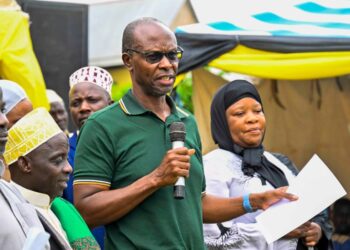By the Central Updates
Bukoto Central Member of Parliament Eng. Richard Sebamala has cautioned the government on the high prices of consumer products in the country which has affected the business sector and the final consumer.
Eng. Sebamala who doubles as a prominent businessman in Kampala city was dissecting issues of public interest on Bukedde TV show “Akabinkano extra” on Saturday morning and questioned why prices of soap have almost doubled in just a period of one year.
“A bar of soap used to cost sh900 in Uganda, it later costed 1500/-, 2500/-, it stabilized at 3500/- but just one year after elections it costs 7000/- yet the sources of incomes haven’t changed in the economy. It is a surprise that raw materials haven’t changed on the international market but the government is busy levying huge sums of revenue on every commodity imported in the country,” Hon Sebamala stated.
He adds that the government through the ministry of trade hasn’t made it a priority to protect consumers but it has succeeded in levying high taxes to prioritize foreign security and paying the huge national debts acquired on almost every project established in the country.
In some parts of the country, a bar of soap costs between 6500/- and 7000/-. Prices for manufactured goods and construction materials have in the last four months risen by 22% and 15% respectively.
A report released by the Uganda Bureau of Statistics recently also noted a general rise in producer prices, known as factory gate prices.
Notable increases were in metal products, with a 39.6% rise, soap and chemicals with 32%, processed food with 23% and bricks and cement with 18%.
This was mainly due to increased cost of raw materials coupled with increased transport costs, said principled statistician Peter Opio.
The increase in fuel has also doubled prices of goods and transport, especially essential goods including among others cooking oil, soap and rice.
Eng. Sebamala said that regardless of the sky rocketing prices of consumer commodities a certain group of people is not affected because their bills are catered for at the expense of the taxpayer.
Last month the government revealed that it had sorted out fuel supply challenges, adding that pump prices would normalise.
However, nearly a month after the proclamation, pump prices are still above Shs5,000, which is an average increase of Shs400 from the price before the crisis hit the country at the close of 2021.
Fuel prices began rising in July 2021 from Shs3,700 for petrol and Shs3,200. By December 2021, a litre of petrol cost Shs4,580 yet demand was low due to restrictions of certain sectors of the economy.
During the 2021/2022 Financial Year, the government increased excise duty on fuel from Shs1,350 to Shs1,450 per litre of petrol. The tax on diesel rose from Shs1,030 to Shs1,130 per litre.
Early this month, the State Minister for Minerals, Mr Peter Lokeris, told Parliament that fuel prices would normalize mid-February.
However, there is still no sign that fuel prices will come down anytime soon.
Do you have a story in your community or an opinion to share with us: Email us at editorial@watchdoguganda.com












